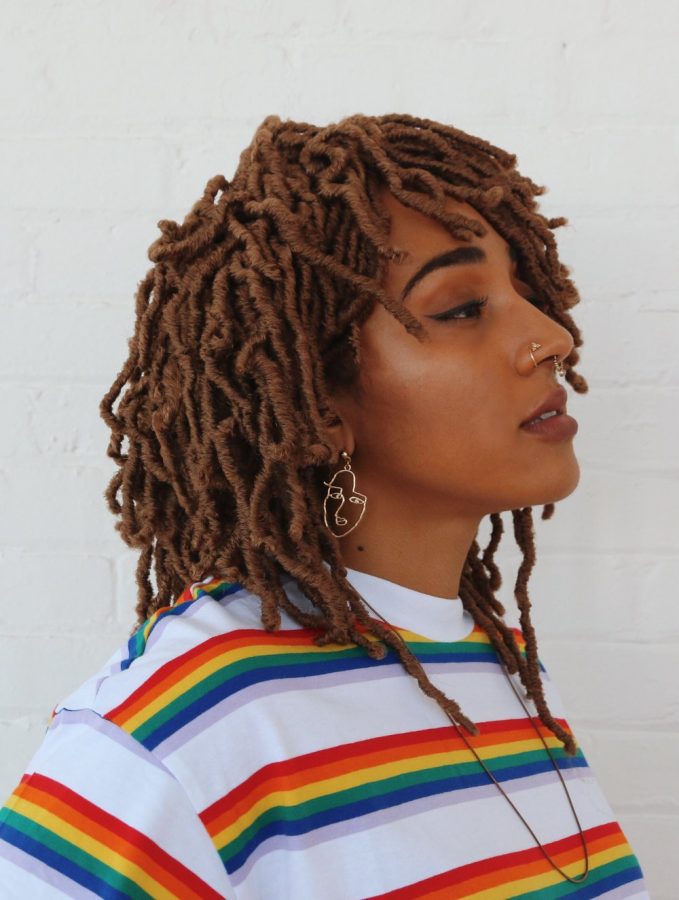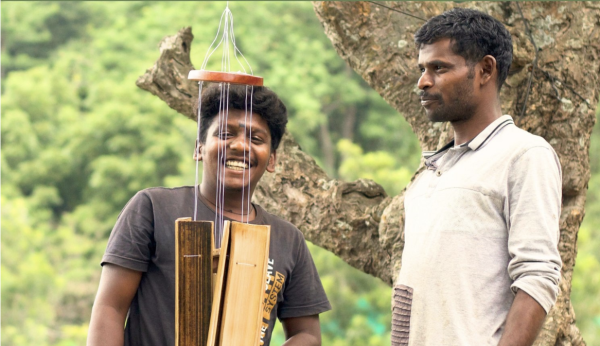Annika Hansteen-Izora, Poet
Courtesy of Annika Hansteen-Izora
Annika Hansteen-Izora, OC ’17, performed at the Cat in the Cream last weekend. While at Oberlin, she founded OSlam and went to three College Unions Poetry Slam Invitationals quarterfinals.
Annika Hansteen-Izora, OC ’17, returned to Oberlin this past weekend to perform poetry at the Cat in the Cream as the opening act for Porsha Olayiwola. While a first-year at Oberlin, Izora founded OSlam, now one of campus’ most influential organizations, which turned five this year. To quote the event description, she “is a queer Black poet, artist, and activist. She believes in the power of Black joy, of protecting Black girl rage, and uplifting the stories and magic of the women before her.” Some of her work can be found on her Instagram, @annika.izora.
This interview has been edited for length and clarity.
How did you get your start writing and performing poetry?
Well, the women in my family have always been creative. My mom and grandmother were doing spoken word in the ’90s in Palo Alto, [CA], going to jazz festivals and Black artist pop-ups out in the Bay Area. My grandmother introduced me to it when I was young, and I’ve been writing poems since then. From that, I got introduced to Youth Speaks, which was a poetry organization in the Bay Area. I didn’t know what Slam was. When I got introduced I was like, “Oh my God, this is everything,” because it was largely Black and Brown kids like me. They were delivering powerful speeches, and they were my age. So it totally opened up the world to me.
How would you say that traditions in spoken word have influenced your work?
I write to free myself and to feel myself. My family, especially the women in my family, have always done that, since before I was alive. That’s why my goal is to talk about me and my experiences. If it ends up teaching something about Blackness or queerness or womanhood at a societal level, that’s amazing. My work is also about taking my place as a Black queer artist in the world, loudly, and being unapologetic about that in a world that usually wants Black people, queer people, women, and artists to apologize.
What is your writing process like? Can you take me from start to finish on a typical poem?
There are so many things that I’m inspired by. When I see something that moves me, I have to capture it. I can be moved to write about revolution or by the color of the sky. I’m a poet that writes in waterfalls. Once one line comes out, the next thing I know I have a whole messy page. And then I start cutting it down and I really ground it in memory and specifics. When I write, I can hear the song. I can hear the words in my head. I’m just trying to capture it.
Do you feel that poetry has the power to meaningfully engage with politics?
My body is immediately politicized, whether I want it to be or not. It’s exhausting. Everything about what I do [is politicized]. If I take up space, especially in white institutions, that’s a political act in itself. So me speaking, me writing poetry, is inevitably kind of a revolution. For me, writing poetry is a means to talk about revolution in an accessible way that isn’t shrouded in political jargon. A lot of that jargon is from our liberal arts education, which uses terms that actually aren’t accessible to all people. To me, poetry is the most accessible form of revolutionary knowledge. I know it, my grandmother knows it, the rest of my family knows it.
What does Slam mean to you?
For me, Slam is the community, and the poetry is the art form. The Slam community has problems, like any. But for me, Slam is one of the most powerful platforms for art, and I’ve heard a huge range of voices there, speaking from across different experiences. It’s been the most accessible way for me to engage with revolution, with community, with freedom. And it’s a space where people listen, where people are really deeply listening to each other and want to take their art and move it into action. It doesn’t stay within a closed space. It always is working to incite some type of action whether that’s thinking deeply or going out into the streets. … It represents community, in the deepest way.
In your poem “Praise,” you talk about how your experiences navigating life as a Black woman have been shaped by your grandmother’s advice. How does identity inform your poetry?
That’s a hard question. I’d say it goes back to what I was saying earlier. As a Black queer woman, the world doesn’t want people like me to exist, so everything I do is about identity. Especially living in a place like Portland, [OR] which is the whitest city in the U.S., even something as seemingly insignificant as me going to get juice is political, because people will touch my body and my hair without permission. I write about those experiences. [That’s why] identity is part of everything that I write about.
One of the poems you performed at OSlam was about a group text with ex-Oberlin people. In what ways did your time here shape your creative work?
My years at Oberlin were the most transformative of my very young life so far. I was a nerdy-ass kid from Portland, OR, and never had a Black community before. I’d only been in all-white environments. Oberlin is a predominantly white institution, of course, but there is also such a strong Black community. So when I entered Oberlin, that was the first time I was really able to celebrate my Blackness, and the celebration was because of my homies. My homies were everything and continue to be everything — my strongest support system, my ride-or-dies, the people who I suffer with, the people who want me to be bigger and better in the world. … I write about joy a lot — the joy that they give me, the joy that I give them. It’s a part of my healing, giving me faith that my writing could really do something. So I wrote about the group text, because that was a source of joy for me.
Do they make art? Is that something that you guys work on together?
All of them do art. All of them are creative. Some are trying to be lawyers, others are working to be doctors and scientists; one is at [Yale School of Drama]. All are creative in their own way, and we’re all hyping each other up in that way. And I think that there’s an idea that you have to be a certain way in the world in order to be able to call yourself an artist. And that’s a lie. If you create, if you make things, you’re an artist.











